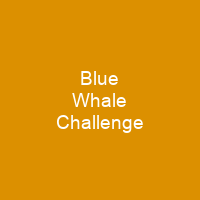Imagine a digital monster lurking in the shadows of social networks, whispering sinister tasks into the ears of its young victims. This is the ‘Blue Whale’ challenge, a phenomenon that has sent ripples of fear and confusion across the globe.
The Origin and Spread
First reported in May 2016, the Blue Whale challenge quickly became a topic of intense debate. Was it real? Could it really be responsible for suicides among teenagers? The game reportedly began as an innocuous series of tasks, but soon escalated to more dangerous and ultimately deadly challenges. It spread like wildfire through social media platforms, drawing in unsuspecting young participants.
Bans and Bans
The challenge was banned in several countries, including Egypt, Kenya, and Pakistan, due to its potential for harm. However, experts argue that the game’s ability to adapt and spread across various platforms makes it nearly impossible to completely eradicate. Is banning the solution, or are we just chasing a digital ghost?
Theories and Speculations
The origin of the name ‘Blue Whale’ remains shrouded in mystery. Some reports suggest it comes from a Russian rock song, while others point to its association with the vastness and unpredictability of the internet. The game’s administrator is believed to be children aged 12-14, who were drawn into the story as it gained widespread attention.
Counter Movements
In response to the Blue Whale challenge, various movements emerged to combat its influence. In Brazil, for instance, a movement called Baleia Rosa (Pink Whale) was created to promote positive tasks and combat depression. Another initiative, Capivara Amarela (Yellow Capybara), aimed to guide people seeking help.
Global Impact
The Blue Whale challenge has left its mark on numerous countries, from Russia to India, with reports of suicides, self-harm, and attempted suicide linked to the game. In some cases, governments issued warnings or even blocked social media groups related to it. Is this just a fleeting trend, or is there something deeper at play?
Legal Actions
In Russia, authorities took action by passing a law that introduced criminal responsibility for creating pro-suicide groups on social media and imposing penalties for inducing minors to suicide. In Saudi Arabia, 47 video games were banned due to alleged links to the Blue Whale Challenge.
Conclusion
The ‘Blue Whale’ challenge is more than just a game; it’s a complex issue that touches on mental health, social media influence, and the darker aspects of online culture. While its existence remains controversial, one thing is clear: we must remain vigilant in protecting our children from such dangers.
You want to know more about Blue Whale Challenge?
This page is based on the article Blue Whale Challenge published in Wikipedia (retrieved on November 25, 2024) and was automatically summarized using artificial intelligence.








